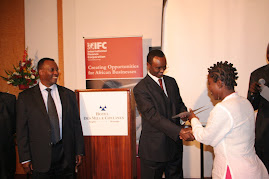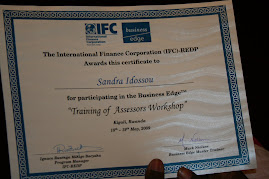http://www.newtimes.co.rw/index.php?issue=14158&article=2759&week=05
“For the purpose of confidentiality, I’m not going to give out my name here. You will understand why when I explain to you the type of job I do.
I am what some people call the “Service Police” but as I do not have any rifle or the ability to fine citizens, I prefer to compare my job to a private detector’s. I actually investigate on different types of services on behalf of Shei & Enz Consulting.
My job is simply to go round service providing companies in town, small, big, retail, public, private institutions etc just to experience the type of services they offer to their customers.
This is an exciting job because no one actually knows that I’m paid to pry on what they are doing. When I come round your business, I behave like any normal customer. I ask questions like any customer and I go back to report on what I experienced.
But the difference between a normal customer and myself is that while in your business, I look round everything; the entrance, the decoration, the ambiance, the cleanliness of the areas, the attitudes of your staff, their professionalism, their communication skills etc.
Sometimes, I even look at how the manager or supervisors behave towards their customers. As you know, poor customer service does not only come from junior staff. It is unfortunate that even managers fall short in this.
The last time, I was in the office of a manager, he dealt with me as if I was a rug. He was impatient and aggressive. He had no professional manners and I wondered how he managed to be at that post.
Anyway, coming back to what I really do while standing unattended to in your shop, my attention is also drown to what other customers are saying about your services. You can not imagine the types of complaints I hear from other customers who are waiting.
But then, I do not only listen to customers complaints but also to what your staff are saying among themselves. Most at times, their conversations are on their private personal issues even in front of customers. Sometime ago I was in a hospital and in he waiting area, there were two nurses who were passionately gossiping about one of their Doctors.
They said he was unprofessional and doesn’t always diagnose the right ailments of patients.
After hearing so many horrible things about this doctor, you can imagine my shock when I came in front him. I nearly ran away. Of course, I never trusted him and I never took the medication he prescribed to me.
The huge part of my work is to write in a detailed form, everything that I saw or heard. Good observational and recall skills, honesty, objectivity are part of my required qualities. My reports help companies see the exact areas in their services that need to be improved upon.
I am a “Mystery shopper” and my job helps you to see your business through the eyes of your customers.
Companies who conduct frequent “mystery or secret shops” of their businesses are on a better way of improving on their services. Sometimes, I even use spy cameras and this is an excellent way of making employees become more responsible on their attitudes.
A well-thought out mystery shopper program will allow you to evaluate the accuracy of your training program. It is an excellent way of following up on your staff.
If your employees are taught in a training program that they must greet the customer in a certain way for instance, my report as a mystery shopper will show you if they really put into practice what they have learnt.
If you train your employees, you definitely need to test them as well. As part of the process in mystery shop your company, you need to let your staff be aware of this.
Explain to them why you are planning a mystery shop. This program should never mean to create fear in the minds of your employees. Explain in a positive way that it is part of the “on going” training program of the company and that the best way to improve business is to find out what the customer really wants.
As you are looking for unbiased feedback and results, you need to hire a professional mystery shopping company.
Before becoming a mystery shopper for Shei & Enz for instance, this consulting offered me a variety of trainings to prepare me on this new and exciting job.
Another important element to note here is that Consistency is key to a successful mystery shopping program. It is not a one-off thing. You need to do it frequently and monitor results. Whether the results are positive or negative, you will have to call your employees for a meeting. Praise them first, then sensitize or punish for repeated poor results.
Take corrective measures remember that your mystery shopper experiences the same services as a normal customer”.
A mystery shopper program takes time to create but believe me; it will provide your business continuous outstanding service.
The author is a customer service consultant working in Rwanda
sandra.idossou@sheiconsulting.com












































